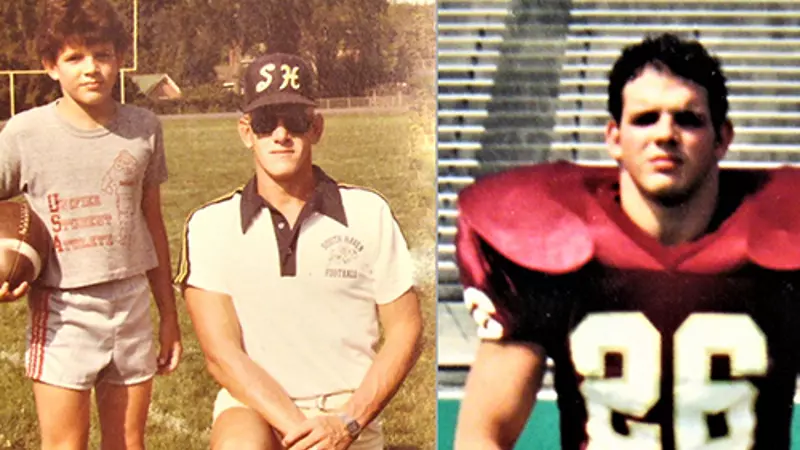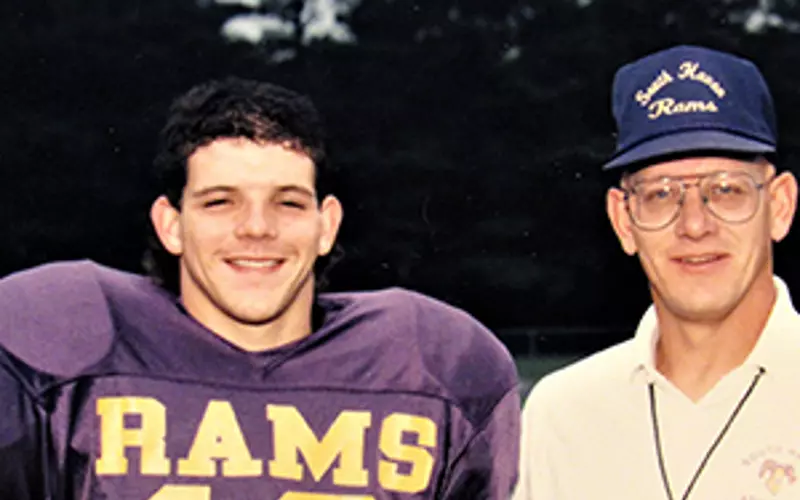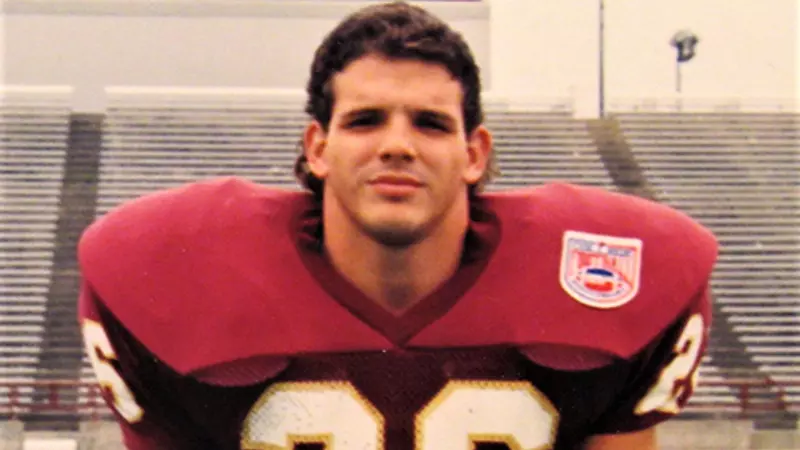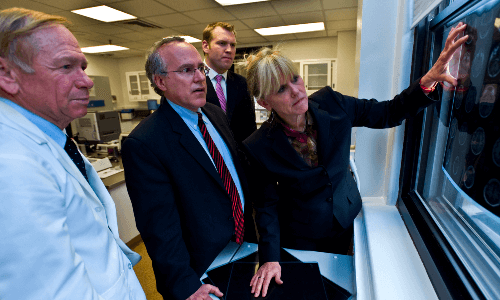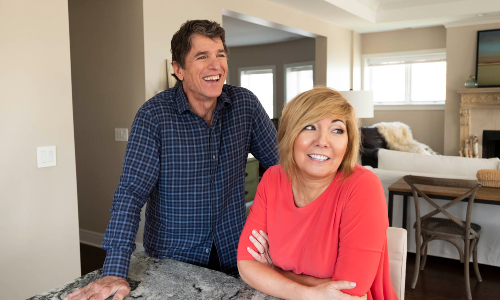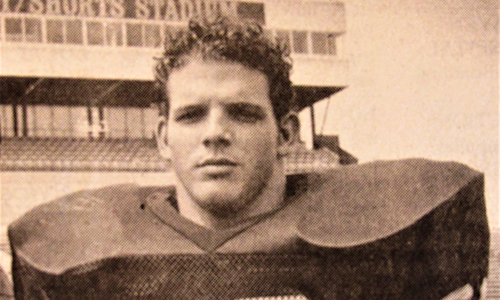
Unsettling changes
After college, my life seemed to move along well. I met and married my former wife while at CMU. The best men in my wedding were my fellow teammates, my best friends. The university welcomed me back in 1997 as a graduate assistant coach working with the football team. I was engaged to be married on the campus of CMU. You see, many milestone events and lifelong relationships are the result of making the decision to play football at CMU. This is part of the complicated relationship I have with the game. Afterwards, life moved along like it does for the majority of former college football players—without football.
As is the case with many things, I was not the person who first noticed changes to my personality. It was my wife at the time who saw subtle changes in me become more noticeable and not so subtle.
These included the following:
- irritability/low frustration tolerance
- aggressive behavior
- anxiety (which I never had prior)
- involuntary tics
- tremors in my left hand
- difficulty understanding conversation
- cognitive changes
- difficulty integrating information
- difficulty paying attention
- sound sensitivity
- language difficulties
- mood swings
These symptoms slowly became part of my personality. My wife at the time raised her concerns to me in the fall of 2016. This was shortly after our second separation. Some of the reasons for the separation were my aggressive, angry, erratic behavior, irritability and mood swings. She told me she was afraid I was showing signs of CTE. I will admit that at first, I didn’t buy into what she was telling me.
I balked at her suggestion for a couple of months and thought the symptom patterns she pointed to were coincidental. But something happened as I sat alone at night with my thoughts. I noticed some things I had attributed to coincidence may not be at all. I was not able to always understand people when they were talking to me—I could hear their voice but not understand any of their words. At times, when speaking, I was unable to find the words I wanted to use. I was angry more often about insignificant things and I noticed big mood swings. There were times I had to leave and try and get in a quiet environment because any sounds, even a whisper, felt like a pick into my brain. I remembered I had been having problems with dropping items out of my left hand, and my left hand would show signs of tremors at various times. These symptoms became a part of who I was so gradually that it was hard for me to notice. I had been coping with them and living with them, but in retrospect these symptoms became my new normal over the previous 4-5 years.
At first, I didn’t believe my wife. Then, I didn’t believe myself. I thought it was all in my head. But educating myself on CTE, current research, and stories from others experiencing similar symptoms has helped me understand that what I am experiencing may not be coincidence. CTE is real, there is ample evidence to back it up, and it may be the cause of my symptoms. I am constantly looking at the research and my symptoms to remind myself that what I am going through is legitimate and what other people are going through is legitimate and there is support out there.
As I stated earlier, many of the best things in my life were the result of making the decision to play football at CMU. The game of football has always been a part of who I am. That is why I now have such a complicated relationship with the game I grew up loving. I don’t know how prevalent CTE is among former players, that is not my role in this story. I simply know these symptoms, which are consistent with those of CTE, are my reality.
What my symptoms are like
Imagine blinding pain and the feeling that an ice pick is being driven into your brain, and the cause is your friend at the front of the church speaking in a “normal” tone. The pain in your head is so bad you can’t understand the words and must excuse yourself and leave the service. You become aware of intermittent tremors in your left hand; a type of feedback you’d never experienced before. You observe difficulty with fine motor skills, such as picking things up with that hand, and create rationalizations as you drop things out of the same hand (something you have never done) while not truly understanding the underlying reason.
Now imagine irritability. Not just normal grumpiness, but explosive anger at people you love, strangers, and situations in general. It doesn’t occur in dramatic situations where a lot of emotion may reasonably be expected, they are normal, everyday life situations.
Imagine stuttering and stammering, being unable to find the appropriate words when speaking. You feel frustrated by speech and communication, once a cornerstone of your personality, and watch it erode to something that is no longer a strength. Add forgetfulness—not being able to recall what you were speaking about and details about recent interactions. Wondering whether you performed a task you were going to do or if you still need to do it.
Any one of these symptoms may not mean a lot standing on their own. They are symptoms millions of people encounter as they move through the various phases of life. When these symptoms are experienced together or with a multitude of other symptoms, as happened to me, it may be evidence of a bigger issue. I was left angry, confused and numb. I couldn’t comprehend what was happening to me, I wasn’t able to put the pieces together. I needed help and after that I needed hope, which is why I am sharing my experiences. If I can be that hope for someone else, it is worth being vulnerable.
Managing my symptoms
Once I accepted what I was experiencing was tangible and real, the next task was finding treatment. This task loomed large and initially seemed quite daunting. I was fortunate that I was referred to a doctor by my wife at the time who wanted to treat me and help. Currently there is no cure for CTE. It is classified as a neurodegenerative disease. Physicians are able to treat various symptoms to slow their progression, but not the underlying disease. I have searched and tried various treatments that have provided various levels of relief from the symptoms.
These include meditation, physical activity, a diet high in plant-based nutrition (my diet does include some meat), neurofeedback, infrared laser treatments and putting a safety net in place. The treatments seem to vary in their efficacy. I have not been able to figure out the reason for this, but I will continue to study, track, and educate myself on what works for me.
The point I want to make is that there is help out there. Even if it is just treating your symptoms. There is help available from caring physicians and support groups who want to help you manage your condition. Keep looking for those special folks who embrace this challenge and are not cowed by it.
The importance of a support network
This path seemed solitary for much of the first year. I felt it was a journey I would need to take alone. I could not have been more wrong. When I was a player I thrived in the atmosphere of the team, the comradery of the team. This fight for myself and the thousands out there like me has to be done the same way. We have to be there for each other, even if that is all we have. I have embraced this attitude and feel fortunate to have people in my life who want to understand and are willing to travel this journey to provide support.
The week my then wife approached me with her concerns regarding my symptoms, Rashaan Salaam, former Heisman Trophy winner from the University of Colorado, died by suicide on a park bench in Boulder, Colorado. The news affected me deeply. It happened approximately 40 miles from where I was living at the time. I did not know Rashaan, though we were playing college football in the same era and living in the Denver, CO area. I do not know what was going on in his life or what events led him to make the choice he made. We do not know if he had CTE (Rashaan’s brain was not studied because of religious reasons) but it was reported family and friends said he displayed symptoms of CTE. I am not able to speak to his experience firsthand, but I do know that when what you are experiencing is validated by people in your life there is a peace in feeling like someone understands what you are going through. I hope that whatever else was happening in his life, he found that peace.
That thought continued to play in my mind as I decided whether to write this story down. I was initially reluctant to tell it. There are only a very small number of people who know what I am experiencing. I have been very private about it for many reasons, including not wanting to worry family members or think of what the future may look like with them. One of my biggest fears was that I was somehow letting down my former teammates and coaches, including my late father. I was afraid they may see me sharing my story as an attack on them, our team, our family and the game we all loved so much. This is in no way an attack, but rather a call for us to support each other.

My life has changed over the last several years since I started to recognize the symptoms that have become a part of my life. I am no longer married and there are times when things are a struggle, when treatments don’t seem to be working and I just want my old self back. These are the times that I have to force myself to lean on those close to me. It is in those times that I make sure I fall back on my faith in God, my beliefs, and the support and safety net of loved ones I have put in place. I will tell you that my life is better than it has been in recent years because I have made the decision to live mindfully, daily. I am blessed that I am able to fight. I am blessed because there are people in my life who try to understand what is going on and are there for me.
Embracing hope
The growing knowledge about CTE and the experience of others gives me a sense of peace. I don’t have to question whether what I am experiencing is quantifiable to fight it. I will tell you these symptoms, be they CTE or something else, will be battled until the very end, whenever that may be. I am not defeated but instead facing this challenge head on. A wise man once told me that you shouldn’t be afraid of a diagnosis, what a diagnosis allows you to do is to make a plan to effectively treat and fight the cause of that diagnosis.
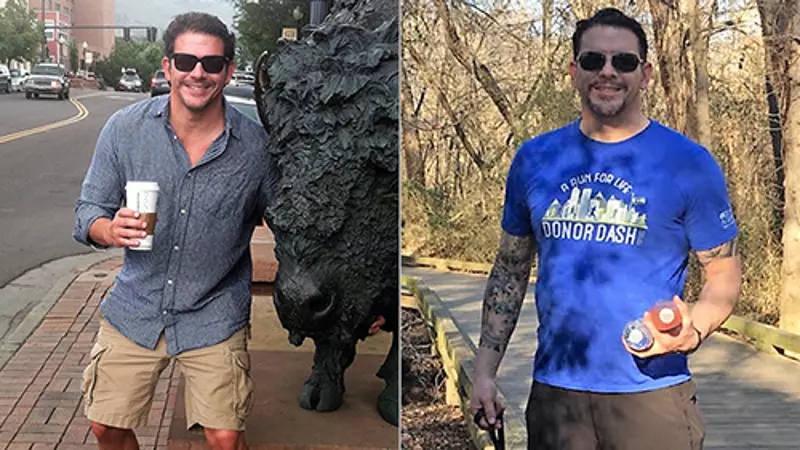
There are times of loneliness and that is when we need our family, friends and brothers. Though we may not have played for the same team in the past, we are on the same team now. We need to be there for each other, to support each other and to help each other in these battles. The fight against TBI, CTE and those symptoms consistent with CTE has gotten much larger than my privacy and any fear I may have had of being negatively labeled.
Maybe you love someone who is going through similar experiences. My hope is that my story provides some level of insight. Maybe you are the one experiencing similar symptoms, that you are feeling lost, confused, angry and defeated. If so, please know that you are not alone and there is help. These symptoms do not define you. They are not the end of your story. They are simply one more part of your journey, a journey that does not have to be taken alone. If there is one person out there in this world who sees and relates to my experience it has been a worthy cause.
